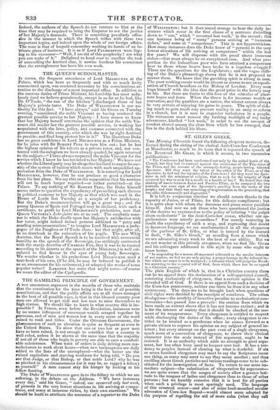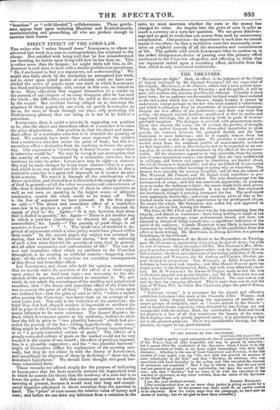ST. GILES'S GREEK.
THE Morning Chronicle found the following eloquent morceau, de- livered during the sitting of the clerical Anti-Corn-law Conference at Manchester, so much to its taste that it reported the speech of the Reverend Mr. GILES, in which it occurs, in two successive publications- .< The Conference had been condemned not only by the united heads of the Church, but they had to contend against the anathemas of the Thunderer of the Times, and the censure of the monopoly-hating, people-loving, talented Spectator. Did they want the talent of the editor of the Times, or of the Spectator, to find out the injustice of the Corn-laws ? did they want the Spec- tator to tell the ministers of religion, that to seek for the iniquity of that accursed law was to seek for a needle in a bundle of hay ? He feared that this shaking of hands between Judas and Pontius Pilate, as he compared the two journals, was some sign of the Spectator's seceding from the ranks of the people; and that there was something of tergiversation in the proceeding, that was alike dishonourable and disgraceful." It is left to conjecture whether we should return thanks in the capacity of Judas, or of Pilate, for this delicate compliment ; but it is quite clear with whom the decorous and pious orator parallels himself. And now we ask those who have questioned the justice of the doubts we expressed as to the policy of inlisting " the pulpit drum ecclesiastic" in the Anti-Corn-law cause, whether our ap- prehensions were utterly groundless ? For merely venturing to doubt the expediency of such a step, and expressing that doubt in decorous language, we are anathematized in all the eloquence of the purlieus of St. Giles, or what is termed by the learned in flash, " St. Giles's Greek," as seceding from a cause which we are advocating every week to the best of our ability. But we do not wonder at this priestly arrogance, when we find Mr. Galant and his colleagues addressed in this style by some who ought to know better.
" In suspending for a season all argument addressed to the secular interests of our readers, we feel we are only paying a proper homage to the tribunal be- fore which our cause is to be arraigned ; a tribunal which will judge the Bread- tax according to the revealed will of God, from which there can be no appeal in a Christian country."
The plain English of which is, that in a Christian country there can be no appeal from the declaration of a self-appointed council, consisting exclusively of clergymen, that a certain opinion is the revealed will of God. If there is no appeal from such a decision of the Corn-law controversy, neither can there be from it in any other controversy. The days are to be brought back when questions of civil rights were decided by the rescripts of conclaves. The odium theologicum—the acerbity of invective peculiar to ecclesiastical con- troversies—has passed into a proverb : the oration from which we have made an extract shows that it has not become extinct ; and it is for the interest of society that it should be checked at the mo- ment of its reappearance. Every clergyman is entitled to respect while discharging the duties of his office ; every clergyman is en- titled to be treated as a gentleman when he comes forward as a private citizen to express his opinion on any subject of general in- terest ; but every attempt on the part even of a single clergyman, much more of a convention of clergymen, to throw their clerical character into the scale instead of fair argument, ought to be resisted. It is an authority which adds no strength to good argu- ment, but has often been used to lacquer over bad. It has a ten- dency to perplex instead of clearing up what is doubtful. If six or seven hundred clergymen may meet to say the Scriptures mean one thing, as many may meet to say they mean another ; and thus cavilling about Greek particles and various readings come to be sub- stituted for the investigation of facts. To return to our more im- mediate subject—the substitution of vituperation for argument-- we are quite aware that the usages of society allow a greater lati- tude to the tongues of ladies and clergymen than to those of other persons ; but we humbly conceive that it is best for all parties when such a privilege is most sparingly used. The language of this reverend orator—and also of some loud-mouthed secular advocates of Corn-law Repeal—would almost seem adopted for the purpose of repelling the aid of more calm (what they call
"heartless" or " cold-blooded") collaborateurs. These gentle- men appear bent upon imitating Macbriar and Kettledrummle, anathematizing and proscribing all who are profane enough to exercise their reason.



























 Previous page
Previous page